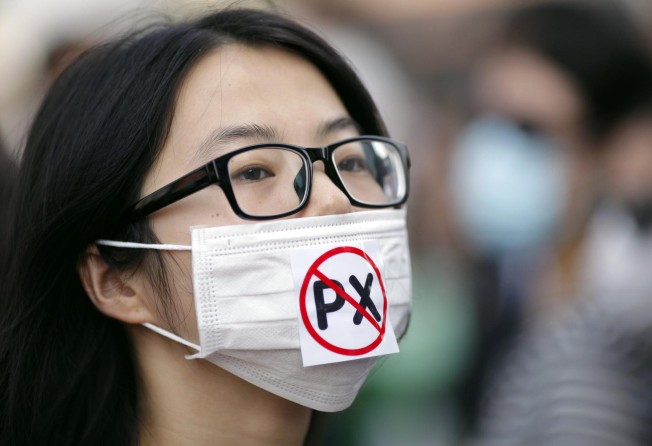Science students embroiled in plant safety debate
Authorities play dangerous game by having people still studying at university act as experts

The latest public protests over paraxylene (PX) manufacturing followed a disheartening pattern: a local government suddenly unveils the planned project to the public, who in turn demand additional information - such as an environment impact assessment report showing that the proposal is safe.
Residents' fears escalate into anger, then they take to the streets, often sparking a showdown with authorities.
With the current outcry over a proposed PX facility in Maoming in southern Guangdong province, one aspect of the affair bears closer examination. It reflects how propaganda authorities work to give the public a misleading impression about a hot-button topic, all in the name of bearing witness to the truth.
Some internet users on the mainland said last week that since the Maoming protests began, the definition of PX on Baidu Baike, the Chinese version of Wikipedia, had been repeatedly revised by Maoming residents and some Tsinghua University students majoring in chemistry.
The users took screenshots of the Baidu Baike webpage to show how the definition of PX repeatedly switched from using the phrase "high toxicity" to "low toxicity". The students, who are assumed to know what they are talking about, were wielding the "sword to defend science", as state media claimed.
According to Baidu Baike's records, the definition of PX changed some 30 times since March 30, the day protest broke out. The group behind the "high toxicity" claim gave up and the website operators blocked further changes to the definition.
But the war of words drew the attention of state-owned media. As usual, they avoided reporting the protests on most days, other than to highlight that several dozen people had been detained by Maoming police, including for spreading rumours.
The website of the People's Daily, the mouthpiece of the Communist Party, ran a 2,800-character article on Sunday, praising Tsinghua students for "defending the truth", and that their definition of PX had been "tampered with".
The next day, the print edition of People's Daily ran a short commentary, saying Tsinghua students were "safeguarding science".
State-owned China Central Television ran a four-minute segment on the issue on its main evening newscast on April 7. It said Tsinghua students were doing the right thing, PX had low toxicity, and Maoming people should not worry about it.
CCTV not only ignored the protests, but more importantly, why people were unconvinced by the government's assurances.
Authorities have spouted the line before about harmless chemical plants, but this time they cloaked their propaganda in the "authority of science".
Holding up Tsinghua students as impartial experts is a deeply worrying tactic, especially as officials are committing the fallacy of appealing to authority - in this case, that the students' opinions should be accepted at face value simply because of who they are, even though they provided no other reasons to back their claim. Such faulty evidence is the antithesis of the scientific method.
Further, the risk posed by PX is only one aspect of the issue - another is whether authorities could safely build such a plant and handle the waste. The government seems to think the opinion war can be won on mere assurances on the safety of PX alone.
State-owned media largely ignored how the government could improve communication with the public. Instead it focused on "misguided people" playing a cat-and-mouse game on Baidu Baike.
Selective use of scientific knowledge is perilous. No doubt the young students were defending what they had been taught in school. But in a world driven by research and technology, where the leaders in innovation uncover new drivers of economic growth, Beijing risks harming the professional integrity of a new generation of scientists.